As a registered dietitian, I love learning about the latest nutrition trends in a new year! This trend report shares top food trends of the past year, 2023, with a look at what's on the horizon for the future of nutrition in 2024.
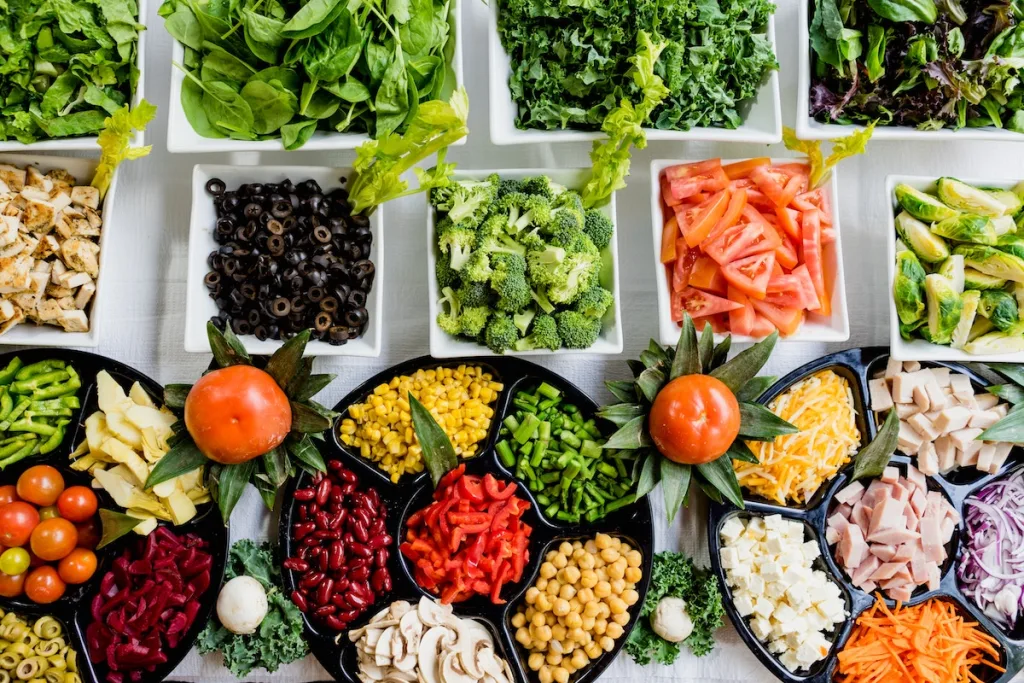
Jump to:
1. Plant-Based Diets
There's no denying that plant-based foods are a big nutrition trend gaining popularity. Social media feeds are swarming with recipes for a vegetarian diet.
People decide to eat more plants or completely avoid animal products for several reasons. Often those reasons are personal and align with a person's values. Examples include animal rights, environmental sustainability, health benefits, religion, or simply because they prefer plant foods over animal foods.
In general, a vegetarian is a person who does not eat meat. But there are several specifications of vegetarianism:
- Flexitarian Diet: predominantly vegetarian but eat a small amount of meat, poultry and seafood which may include dairy or eggs.
- Pescatarian: predominantly vegetarian but eat seafood and fish.
- Vegetarian or lacto-ovo vegetarian: do not eat animal flesh but do eat animal products such as eggs, milk and dairy products, whey protein, and honey.
- Vegan: entirely plant based and exclude both animal flesh and animal products.
- Plant-forward: a style of cooking and eating that emphasizes plant-based foods but isn’t limited to them.
The many health benefits of a plant-forward eating pattern include a decreased risk of certain health conditions including heart disease and type 2 diabetes, a lower cancer risk, and weight loss. It can also lead to lower cholesterol and blood-pressure levels. Many people say they feel like they have more energy when making plant-based food choices, too!
With so much consumer interest in the vegan diet, innovative plant-based meals and plant-based proteins including meat alternatives are hitting the shelves of grocery stores every day. Not to mention, many whole-foods are good sources of protein aside from animal products. There are numerous options for people who want to cut back on meat consumption and still get enough protein in!
Vegan diets often include a lot of nutrient-dense foods including fruits and vegetables, whole grain cereals and breads, tofu, soy beans, lentils, quinoa, tempeh, nuts and seeds, and legumes.
If you are starting a plant-based diet, talk with a healthcare provider or dietitian to make sure you are meeting all your nutrition needs. While plants are high in many essential nutrients, you may need to supplement with Vitamin B12, Vitamin D3, calcium, iron, and zinc to avoid nutrient deficiencies.
Learn more about a Plant-Based Diet

2. Functional Foods and Functional Beverages
A key trend from this year is functional foods. The idea of food as medicine isn't new. It was first introduced by the father of medicine, Hippocrates, about 2500 years ago when he said “Let food be thy medicine and medicine thy food.”
The term functional foods was coined in the 1980s by the Japanese government. Functional foods are defined by nutrition experts at the Academy of Nutrition and Dietetics as whole foods or fortified, enriched, or enhanced foods that have a potentially beneficial effect on health when consumed as part of a varied diet regularly at effective levels.
This nutrition trend includes foods that decrease the risk of chronic illnesses, as well as foods that support your immune system, energy levels, mental and brain health, gut health, and hormone health. Currently, no legal definition of functional foods exists and the claim is not regulated by the FDA.
Functional foods are also sometimes referred to as “nutraceuticals”. Call them what you want, functional foods provide some kind of health benefit. It is the farthest end of the spectrum from empty calories. If you are focused on the nutrition trend of eating functional foods, you are sure to fill your cart with foods that serve a purpose!
Learn more about Functional Nutrition and Functional Foods

3. Foods for Gut Health
Many people struggle with digestive health issues and an increasing body of research is showing a connection between gut health and brain health. A proactive approach to taking care of the digestive tract might just be the next big thing.
The gut microbiome refers to the community of organisms that live in your gut, mostly your intestines. There are about 100 trillion micro-organisms found in the human gastrointestinal tract. Most of them are bacteria, but there are also viruses, fungi, and protozoa. Many of the micro-organisms that are found in your gut are good bacteria, and they are vital for helping you maintain balance in your body.
Having a healthy gut microbiome impacts many other parts of your overall health including immune health, mental health, absorption of amino acids and essential nutrients, and even your risk of obesity and chronic illness.
The long and short of it is this: your gut breaks down the food you eat and absorbs all the nutrients you need to support your body and in turn, your overall health. The gut impacts pretty much every organ in your body.
Fora healthy gut, eat healthy food high in dietary fiber. This includes fruits and vegetables (broccoli, cauliflower, and leafy greens like kale, spinach, and arugula are great options), whole grains, nuts and seeds, and legumes. Aim to also eat foods that are good sources of probiotics and prebiotics including yogurt and fermented foods.
Since there is also a connection between gut health and other lifestyle factors such as stress, sleep, and physical activity, try to find ways to manage these areas of your life, too!
Learn more about Gut-Health Foods
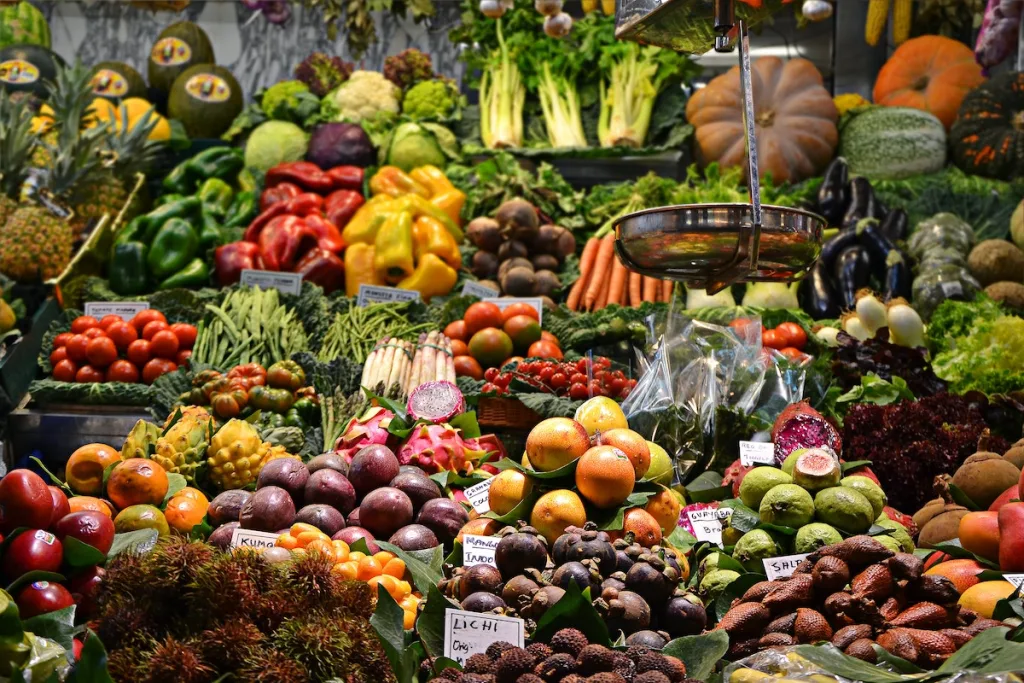
4. Sustainable Diets
Climate-friendly diets are another one of the top trends of 2023. Sustainable eating is a diet pattern that is good for people and good for the environment. The world population is growing rapidly. People who follow a sustainable diet aim to ensure that future generations will have access to a food system that enables them to meet their nutritional needs.
Food production has a monumental impact on the environment. So sustainable nutrition also takes into account food production, climate change and environmental sustainability.
For example, vegetarian diets with less ultra-processed foods can lead to healthy eating that also results in a reduction in greenhouse gas emissions in the environment. Many shoppers only purchase from brands that use sustainable practices to produce and package their foods.

5. Foods for Brain Health and Mood-Boosting Foods
This trend has gained steam because there is a growing body of research studies showing a relationship between diet and brain health, cognitive function, and mood. When it comes to human health, both physical and mental health are intertwined and what you eat impacts how you feel!
Following a balanced diet and incorporating food products that are good for brain health has become a popular trend as nootropics and adaptogens like mushrooms and ashwaghanda are being added to new products.
For a healthy brain, eat more foods high in healthy fats including salmon that is loaded with Omega-3 fatty acids and olive oil that contains Oleic Acid. Other good choices for brain health include foods high in antioxidants, magnesium, B vitamins, and fiber. Nutrients from these foods can help decrease anxiety and depressive symptoms, reduce brain fog, increase mental clarity, and improve cognitive function.
Learn more about the Top Foods for Mental Health

6. Intuitive or Mindful Eating
Intuitive eating is a trend that includes a framework that focuses on honoring our bodies by listening to hunger and fullness cues. It works to undo diet culture. At its center, it aims to help people to be healthy by finding healing and peace with their relationship with food and body image rather than following a particular eating plan or meal plan. Its all about taking a closer look at your eating habits, eating when you are hungry, and stopping when you are full.
Mindful eating is another new way of eating and a slightly different trend than intuitive eating. It focuses on being mindful or aware of your eating experience. This includes how you feel while eating as well as appreciation for the food itself. It encourages a healthy diet and nutritious food, but also discourages judgment if your eating habits are less than ideal.
Learn more about Intuitive Eating

7. Hormone Balancing Foods
Another nutrition trend of 2023 is all about keeping hormones in balance!
Healthy hormones are integral for overall health since they regulate metabolism and stress responses, contribute to blood sugar control, and support your reproductive system.
A diet high in hormone-balancing foods is integral to helping you feel your best, both physically and mentally since hormone imbalance can leave you feeling fatigued, anxious, or with insatiable cravings and weight gain that you can’t explain.
Foods that support hormone health include healthy fats, high quality protein, cruciferous veggies, and foods high in vitamins and minerals like fruits, vegetables, and whole grains.
Learn more about Hormone Balancing Foods
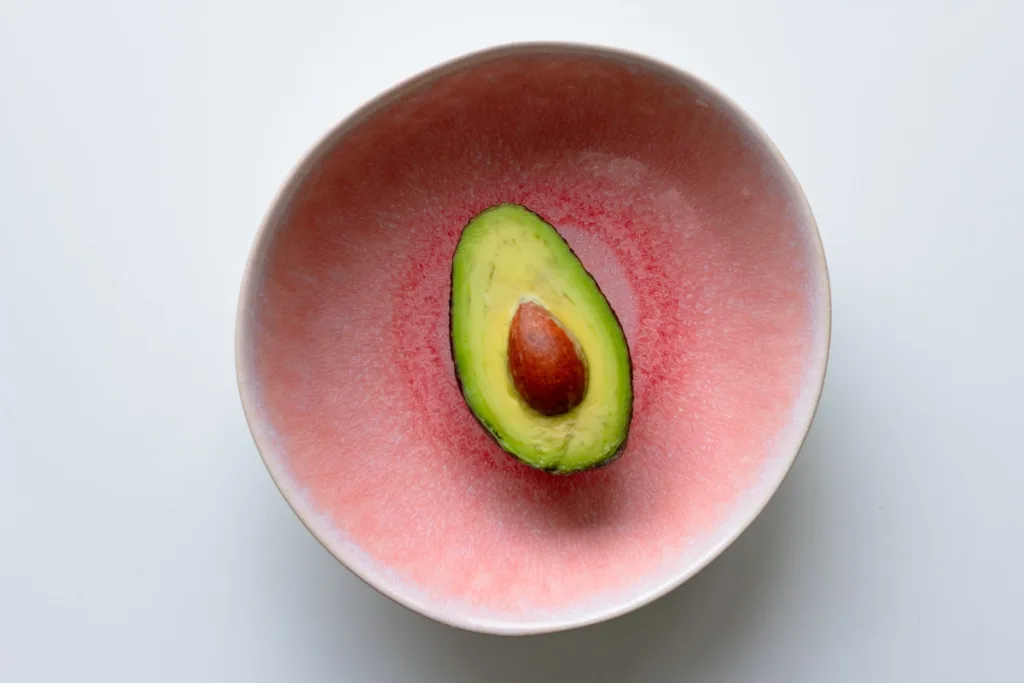
8. Cycle Syncing Diet
The next nutrition trend of 2023 is a cycle-syncing diet. This one is for the ladies! Cycle syncing is all about adjusting your routine based on the phases of your menstrual cycle and what's happening with your body each week. This can help balance your hormones and decrease PMS symptoms.
This nutrition trend typically includes adjusting what you eat, your fitness, and your productivity with tasks at work.
For example, eat red-meat and other iron rich foods during your period. During your luteal phase, the week leading up to your period, you are likely to have more cravings for sugars and junk-food. Consider having dark chocolate which has less added sugars but still satisfies a sweet tooth and contains antioxidants.
Learn more about a Cycle Syncing Diet

9. Sober Curious Movement
Sober curiosity is one of the growing consumer trends in recent years as future generations become more mindful of their health in general. Younger generations, in particular Gen Z, are opting for healthy lifestyles and find other beverages like herbal teas or non-alcoholic beers to be fine alternatives to alcohol.
The sober curious movement trend is all about thinking more consciously about the choice to drink. For some, it means abstaining altogether. For others, it means drinking on occasion, but opting for a mocktail or another alcohol-free beverage on the evenings they choose not to drink.
Learn more about the Sober Curious Movement

10. Personalized Nutrition
The last nutrition trend of 2023 is personalized nutrition. In a world where artificial intelligence is becoming more of a household name, people are using big data companies to customize grocery lists, make meal plans for the week, and order groceries delivered straight to their door. Meal delivery services also offer customized plans.
The personalized nutrition trend recognizes that lifestyle changes should be based on the individual as opposed to a whole group of people. It revolves around the idea that there is no singular best diet that works for everyone because nutrition needs depend on many factors. Some of these factors include lifestyle, activity levels, genetics, environment, and medical history including the presence of chronic conditions or chronic disease.
Simply said, your nutrition needs are as unique as you are. And making food choices based on your health needs as a whole person is important if your goal is optimal health through the use of food and dietary changes.

Nutrition Trends to Expect in 2024
As for trends to expect in 2024, I anticipate seeing a lot more emphasis on plant-based eating, regenerative agriculture, and brain health in 2024. Think mushroom coffee, adaptogen infused waters and teas, and plant-based meats.
I can see the trend toward nourishing meals and snacks continuing to take priority over low calorie and low fat options. As for sugars, I see more products being sweetened with allulose, a naturally occurring monosaccharide that is much lower calorie than sucrose (table stuger).
Lastly, we can't deny that artificial intelligence will play a role in trends this year. Innovative food production and personalized nutrition plans including supplements and meals in the upcoming year will be something we see more of! I also predict a continued trend toward looking at health as a big picture that includes stress management, sleep, and physical activity along with nutritious foods!
In conclusion
Nutrition is ever-changing as new research emerges and people's focus shifts. Some of the top nutrition trends from 2023 are likely to continue in 2024 along with other new trends!
I hope you enjoyed this article! I would love to hear from you if so. Please leave me a comment below or find me on Instagram....I LOVE knowing there’s people out there reading my articles. 🙂 IG: @mallorythedietitian
Want More Nutrition Education?
Here are some posts you may enjoy:


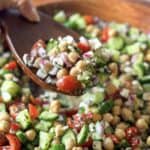



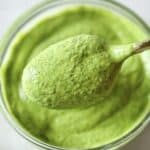
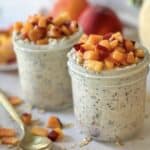




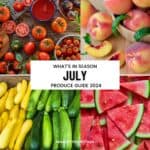



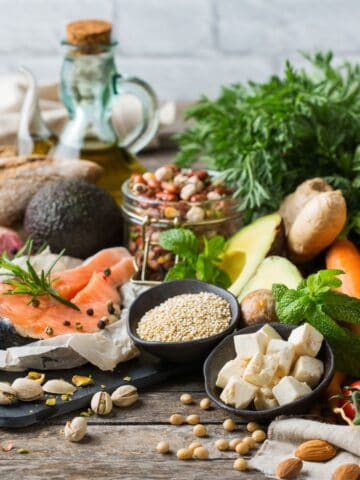

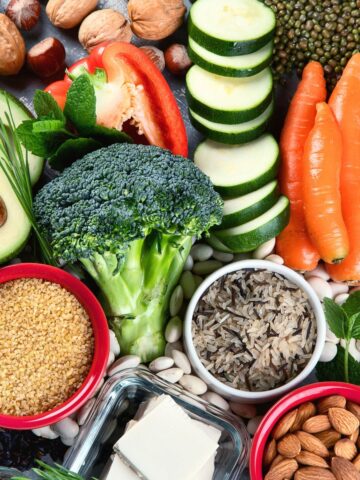





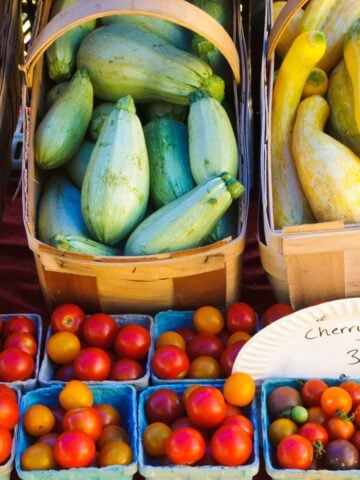

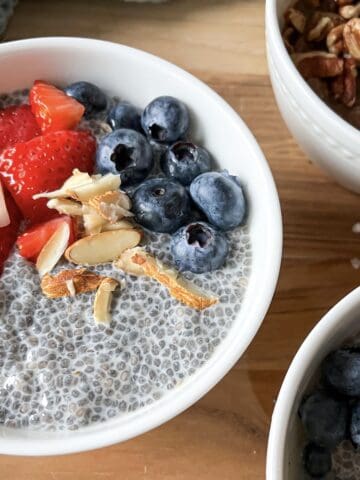

Comments
No Comments